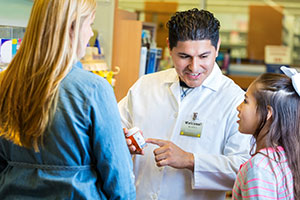Which Meds? New Research Points to a Difference in Stimulants for Adults, Children
ADHD Weekly September 13, 2018

Which type of medication is a better choice among medications when a child or an adult has an ADHD diagnosis? Surprisingly, there has been limited research on this question.
A group of researchers recently published their results comparing seven medications frequently prescribed for ADHD and concluded two types of stimulants appear to work best, but that different stimulants work better for adults and children.
Stimulants seen as more effective
Medications for ADHD fall into two main categories: stimulants and non-stimulants. A third grouping includes several other medications that were not designed to treat ADHD and have been found to be helpful for ADHD symptoms; these often include antidepressants. Our medication charts for children and adults give more details on these medications.
The researchers surveyed 133 clinical trials that included a combined 14,000 children and teens and 10,000 adults who participated in those trials. In this meta-analysis, they looked at how well the medications worked at reducing symptoms and the safety of amphetamines (including lisdexamfetamine), atomoxetine, bupropion, clonidine, guanfacine, methylphenidate and modafinil, along with a placebo, during a 12-week period.
Comparing the effectiveness between the two groups, stimulant medication and non-stimulant medication, the researchers concluded stimulants were more effective at treating ADHD symptoms in both children and adults. Their next finding was a little surprising.
“Evidence from our network meta-analysis supports methylphenidate (in children and adolescents) and amphetamines (in adults) as the preferred first pharmacological choice for short-term pharmacological treatment of ADHD,” the researchers write. Meaning children and teens responded better when prescribed a methylphenidate (brand names include Ritalin, Focalin, Concerta, and Quilllivant) while adults respond better to amphetamines (brand names include Adderall and Vyvance).
What this means for you or your child
Having an evidence-informed idea of which type of medication would be a better starting point for an individual is important when designing a specific treatment plan. When prescribers and their patients or patients’ parents know what medications have been seen to be more effective it helps them make decisions that provide symptom relief more quickly with fewer side-effects, and less time spent on medication trials for that person.
“With an increasing number of people being diagnosed with ADHD and given a drug prescription in the USA, our study provides a starting point for medication, and hopefully helps patients more quickly find a drug that works for them," says researcher Andrea Cipriani, MD, PhD. Dr. Cipriani is an associate professor in the Department of Psychiatry at the University of Oxford in England.
“For people who require drug treatments, our study finds that methylphenidate should be the first drug offered for children and adolescents, and amphetamines should be the first drug offered for adults,” Dr. Cipriani says.
For adults and children who are beginning to include medication management into their treatment plan, these findings could provide additional guidance for treatment providers when selecting medications. However, if you are already have a treatment plan that includes medication management, or your child does, and that plan is working effectively, changes don’t necessary need to be made to treatment. It is more important to have a medication that works effectively for you or your child and to maintain a treatment plan that is working than to make changes based on this study or any other.
Medication management for ADHD
Researchers say they hope the information in this study will be useful in creating and updating guidelines for prescribing medications to treat ADHD symptoms.
“Our findings can inform only the choice of short-term medication treatment for ADHD,” they write. “Our findings represent the best currently available evidence base to inform future guidelines internationally and shared decision-making between patients, [caregivers], and clinicians, when a balance has to be made between efficacy and tolerability of ADHD medications.”
The researchers added that treatment should not rest just on taking a medication to manage symptoms, but should also include behavioral management techniques and lifestyle supports. Effective behavioral management and support can help to reduce a need for medication management for some people.
More on this study:
For more information on treating ADHD in children and adults:
